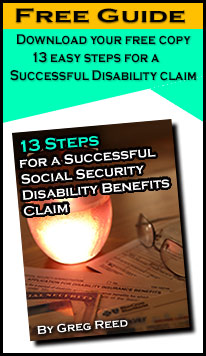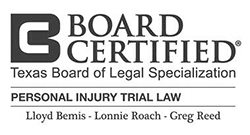How to Qualify for Social Security Disability (SSDI) Benefits
The Social Security Administration has a number of requirements you must meet before qualifying for Social Security Disability
Author: Attorney Lloyd Bemis
Updated 4/25/2024
Social Security Disability Insurance (SSDI) is a federal program that pays you monthly benefits if you are insured under the program and become disabled before you reach retirement age and cannot work.
In order to qualify, an individual must satisfy both the
Social Security Administration’s basic financial and medical requirements.
A. Financial Requirements:
You must first be insured for disability benefits on the date that you become disabled.
There is a two-part test for determining whether you are insured:
1. The “Duration of work test”:
Social Security will want to know if you have worked long enough to be covered under SSDI (the “duration of work test”); and
2. The “Recent work test”:
Social Security will check to determine whether you worked recently enough for the work to actually count toward coverage .
If you have not worked recently enough or long enough to satisfy their requirements Social Security will deny your claim.

Social Security Disability Insurance (SSDI) is a federal program that pays you monthly benefits if you are insured under the program and become disabled before you reach retirement age and cannot work.
1. Duration of Work Test
Instead of using “years worked” to determine whether you have earned enough to be covered, SSDI uses a system based on “credits.” You must have earned the required number of credits while you were working in order to qualify for disability benefits.
- What are work credits?
- How many work credits do I need?
SSDI work credits are calculated based on your earnings, as long as those earnings were subject to Social Security payroll taxes (FICA) or Social Security self-employment taxes. The dollar amount it takes to earn one credit is calculated annually. For 2024, you must earn $1,730 to be awarded one work credit or $6,920 to earn the yearly maximum allowed four credits. You can earn these four credits at any time during the year. You earn one credit at $1,730 of earnings, two credits at $3,460 of earnings, three credits at $5,190 of earnings, and four credits at $6,920 of earnings.
The SSA has established a sliding scale for the number of credits you must earn in order to be covered under the SSDI program. Based on the scale, the older you are at the time you become disabled, the more credits you must have earned for SSDI eligibility purposes. Under the duration of work test, you must have earned a certain number of credits by the time you became disabled.
2. Recent Work Test
In addition to having earned the necessary number of total work credits, SSDI requires that a certain number of the credits must be earned “recently.”
This “recent work test” is complicated and based on your age when you became disabled.
The SSA determines how much recent work you need to have based on the “calendar quarter” in which your birthday falls. The four quarters are defined as being from (1) January 1 through March 31; (2) April 1 through June 30; (3) July 1 through September 30; and (4) October 1 through December 31.
The rules are as follows:
- Before age 24 – You may be eligible if you have 6 credits earned in the 3-year period ending when your disability starts.
- Age 24 to 31 – In general, you may be eligible if you have credit for working half the time between age 21 and the time your disability began. As an example, if you develop a disability at age 27, you would need 3 years of work (12 credits) out of the past 6 years (between ages 21 and 27).
- Age 31 or older – In general, you must have at least 20 credits in the 10-year period immediately before your disability began.
Work years you will need based on your age.
| Became Disabled At Age | Work years you need |
|---|---|
| Before age 28 | 1.5 years |
| 30 years old | 2 years |
| 34 years old | 3 years |
| 38 years old | 4 years |
| 42 years old | 5 years |
| 44 years old | 5.5 years |
| 46 years old | 6 years |
| 48 years old | 6.5 years |
| 50 years old | 7 years |
| 52 years old | 7.5 years |
| 54 years old | 8 years |
| 56 years old | 8.5 years |
| 58 years old | 9 years |
| 60 years old | 9.5 years |
| 62 years old or older | 10 years |
If you have not earned enough while working your claim will be denied,
and if you have not worked recently enough Social Security will deny your claim.
B. Medical Eligibility Requirements:

If the Social Security Administration has determined that you are engaged in substantial gainful activity and you have been denied benefits talk to our attorneys at Bemis, Roach & Reed. We may be able to help find a solution. Call today at 512-454-4000
If you satisfy the financial requirements the SSA will next determine if you satisfy their medical requirements.
Social Security requires that you have a severe, long-term disability and uses a five-step process to determine if you are impaired enough to qualify for benefits.
- Are You Working?
- Is Your Medical Condition Severe?
- Is Your Medical Condition on the List of Impairments?
- Can You Do the Work You Did Before?
- Can You Do Any Other Type of Work?
To qualify for SSDI, your disability must be “total,” such that you are not able to perform “substantial gainful activity” (SGA) for at least one year. SGA is a term used by the SSA to describe a level of work activity and earnings. In 2024, the SGA earning level is set at $1,550 per month for nonblind applicants and $2,590 for those who are blind. So, if you are disabled non-blind but currently working and you make over $1,550/month, you are not considered disabled enough to qualify for SSDI benefits. If you are blind and working, you must not make over $2,590 per month.
Under SSDI rules, your disability must be “severe” enough to interfere with your ability to perform basic work-related activities, such as walking, sitting, understanding and remembering. The medical condition must also be “long term,” in that: (1) it has already existed for 12 months, or (2) is expected to last for at least 12 months or result in your death.
Social Security has created a manual called the Blue Book which lists impairments Social Security considers disabling and may automatically qualify for benefits. If your condition is on this list, you will be considered disabled for SSDI purposes, provided you meet the requirements of the listing. Also, if your condition (or the combination of your conditions if you have more than one) is as severe or worse than the conditions on this “list,” then you will be considered disabled for SSDI purposes
If your medical condition is not in the Blue Book list of impairments, or did not meet or exceed the severity of conditions on the list, Social Security will consider whether your medical condition prevents you from doing the work you did prior to developing the condition. If it does not, then you are not considered disabled “enough” for SSDI purposes. If you cannot do your prior work, they will then determine if you can do any other type of work.
If you cannot perform your prior job, Social Security will evaluate whether you can perform any other kind of work, taking into consideration your medical condition, your age, and your educational background, as well as any past work experiences or skills that you may have that could transfer to any other type of work. If you cannot do other work, you will be considered sufficiently disabled for SSDI purposes.
If you have a medical condition that prevents you from working, you may be eligible for Social Security Disability Insurance.
However, satisfying all the SSA’s conditions to qualify can be challenging. The application process can be difficult with invasive questions, complicated forms, and long waiting periods that can make applying for benefits overwhelming. Let us help. Contact the attorneys at Bemis, Roach and Reed for a free consultation.
At The Texas Disability law firm Bemis Roach & Reed, our attorneys are committed to helping injured or disabled clients receive the benefits they deserve. Mr. Roach is AV Preeminent and SuperLawyers rated and has become a recognized leader in the field of Long Term Disability law. Mr Bemis focuses his practice on Social Security disability while Mr Reed handles both LTD and SSDI claims. Both are AV Preeminent and SuperLawyers rated and all our attorneys have been successfully helping people fight for their rights against big insurance companies and the government since 1993. If you have applied for benefits and been denied call 512-454-4000 for a free consultation and get help NOW.
Disabling Diseases
Bemis, Roach & Reed has helped clients who are disabled from a wide variety of medical conditions. If you are unable to work due to any of the following conditions and have been denied disability benefits, contact us. We would like to help.
- Acid Reflux
- AIDS / HIV
- Alcohol Dependence
- Alzheimer's Disease
- Amputation
- Amyotrophic Lateral Sclerosis ("ALS")
- Anxiety
- Arthritis
- Asthma
- Autism
- Autoimmune Disorder
- Back Pain
- Bipolar Disorder
- Bladder Control
- Blindness
- Blood Disorder
- Brain Aneurysm
- Brain Injuries
- Brain Tumor
- Breast Cancer
- Bronchiectasis
- Bulging / Herniated Disc
- Burns
- Cancer (all kinds)
- Car Accident
- Carpal Tunnel Syndrome
- Cerebral Atrophy
- Cerebral Palsy
- Cervical Disc Disease
- Chronic Fatigue Syndrome
- Chronic Obstructive Pulmonary Diseases (COPD)
- Chronic Pain Syndrome
- Cirrhosis
- Complex Regional Pain Syndrome (CRPS)
- Congestive Heart Disease
- Congnitive Dysfunction
- Coronary Dysfunction
- COVID-19
- Crime Injury
- Crohn’s Disease
- Cystic Fibrosis
- Degenerative Disc Disease
- Dementia
- Depression
- Diabetes
- Down Syndrome
- Endometriosis
- Epilepsy
- Epstein-Barr Virus
- Essential Tremor
- Falls and disability
- Fibromyalgia
- Gastrointestinal Reflux
- Glaucoma
- Headaches
- Hearing Impairment
- Heart Arrhythmias
- Heart Failure
- Hemophilia
- Hepatitis C
- Herniated / Bulging Disc
- High Blood Pressure/Hypertension
- Hip Replacement
- HIV
- Hodgkin’s Disease
- Huntington’s Disease
- Incontinence
- Interstitial Cystitis
- Irritable Bowel Syndrome (IBS)
- Ischemic Heart Disease Disability
- Kidney Disease
- Knee Disorder/Replacement
- Leukemia
- Liver Cancer
- Liver Disease
- Long-COVID
- Lumbar Disc Disease
- Lumbar Radiculopathy
- Lung Cancer
- Lupus
- Lyme Disease
- Macular Edema/Degeneration
- Memory Disorder
- Menieres Disease
- Meningitis
- Mental Illness
- Migraine Headaches
- Multiple Myeloma
- Multiple Sclerosis
- Muscular Dystrophy
- Myofascial Pain Syndrome
- Neurocognitive Disorder
- Neuropathy
- Obesity
- Osteoarthritis
- Pancreatitis
- Paralysis
- Parkinsons Disease
- Peripheral Neuropathy
- Post-polio Syndrome
- Post-Traumatic Stress Disorder (“PTSD”)
- Prostate Cancer
- Psoriasis
- Psychosis
- Reflex Sympathetic Dystrophy (“RSD”)
- Rheumatoid Arthritis (RA)
- Schizophrenia
- Scleroderma
- Scoliosis
- Seizure Disorder
- Sjorgen's Syndrome
- Skin Cancer
- Sleep Apnea
- Speech Disorders
- Spinal Stenosis
- Spondylosis
- Stroke
- Syringomyelia
- Systemic Sclerosis
- Temporal Mandibular Joint Dysfunction (TMJ)
- Throat Cancer
- Thyroid Disorders
- Traumatic Brain Injuries
- Vision Impairment
Try these links for further reading on this subject:
How much does a Social Security Disability Attorney charge?
What Information will I need to apply for SSDI?
Disabling Diseases

Your Free Initial Consultation
At Bemis, Roach and Reed, if we can't help you, we will try to find the right attorneys for you.
We offer each of our prospective clients a free no obligation one hour phone or office consultation to see if we can help you and if you are comfortable with us. We know how difficult a time like this can be and how hard the decisions are. If we can be of assistance to you and help you find a solution to your issue we will even if that means referring you to another attorney.
Or simply call
512-454-4000
to schedule your
Free Consultation
Let's get you Started:
If you could provide us with some basic information about your claim we will get right back with you with a free case evaluation and schedule your Free Consultation Today.









